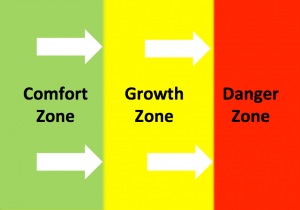 Fear is perhaps the greatest limiting factor in life. It is simply not doing things you know you should or that you really want to. You are often times getting in your own way.
Fear is perhaps the greatest limiting factor in life. It is simply not doing things you know you should or that you really want to. You are often times getting in your own way.
I have been privileged to speak in front of tens of thousands of executives, entrepreneurs, teenagers and everybody in between. During that experience, one thing has become abundantly clear. People, no matter the audience demographic, face the same struggle of overcoming fear. Regardless of the topic I was speaking on, fear was always a root cause of many of the challenges people were facing. Fear can keep us from starting our own business, picking up the phone and making the critical sales call, asking the woman or man of our dreams out on a date, pursuing our passion for singing, telling a coworker their behavior is upsetting, taking that trip around the world or quitting the job that is slowly killing your will to live. The potential impact of fear goes on and on and on. If and how you address your fears can make a massive difference in your life.

To overcome fear one must first understand what fear is. Imagine I invite you to see the neighborhood where I grew up. As we travel around the neighborhood we come across an old abandoned house. I tell you this was the home I grew up in and explain that it has been empty since the day we moved out. I somehow convince you to go explore the house with me. We leave the car just as the wind is starting to whip and the rain is starting to fall. The sun has set and the scene is spooky. As we approach the porch, the screen door flaps in the wind. Just as I reach for the doorknob, BANG! It sounds as though a gunshot rang from inside the house.
Would you go in the house at this point? For those of you that are more adventurous, the answer might be yes. The rest of us would let the police deal with it. However, the response changes if I’m able to explain the sound. After the gunshot sound, if I explain there is a pump in the house that used to backfire all the time when we were kids, then we would be more likely to go into the house. What is the difference in the two scenarios? Knowledge. We have a relatively good idea what the sound was and that has a direct influence on our level of fear.
The vast majority of fear we face is rooted in a lack of knowledge. Consider something you used to be afraid of. Take public speaking as an example. For most of you, the way you overcame the fear of speaking was through practice. You realized after speaking the first time you didn’t actually die on stage like you thought you might. Maybe someone even complimented you. While you originally had a hard time speaking front of a small group of five or ten people, you were soon able to speak in front of fifteen, twenty or more people. You became more comfortable with the process because you acquired more experience and knowledge. We can then assume that to overcome our fear we must acquire more knowledge in the form of experience. This is easier said than done so let’s look at a structure for how to approach fear.
Our level of fear falls into one of three categories:
- The Comfort Zone. Things in our comfort zone are those things that don’t make you nervous. Maybe attending networking events, driving a car or being around dogs are examples of things you
 were afraid of at one point, but they no longer have any fear associated with them. After doing those things enough you no longer even think about them, let alone have fear associated with them. The comfort zone actions are those things you do that have no fear or apprehension associated with them.
were afraid of at one point, but they no longer have any fear associated with them. After doing those things enough you no longer even think about them, let alone have fear associated with them. The comfort zone actions are those things you do that have no fear or apprehension associated with them. - The Growth Zone. When you feel nervous about something, this means you are in the growth zone. The growth zone is extended beyond your comfort zone. The critical thing to remember about the growth zone is that as you spend time here your comfort zone will expand. Once you gain experience with the activity that has put you in your growth zone, you will find that you are no longer nervous and now in your comfort zone. You no longer have that fear of public speaking or being around dogs. Interestingly, your growth zone will also expand and your danger zone will shrink making things that were once impossible for you, possible. Thus, by spending time in the growth zone, you will ultimately be able to attempt and accomplish many more things in your life than if you choose to avoid those things that made you nervous.
- The Danger Zone. Things that push you beyond your growth zone are in the danger zone. I am afraid to fly. While I am much more comfortable with it now, it is still very much in my growth zone. If I was to go skydiving I might never get on an airplane again. I might be able to work up to skydiving if I spend a lot of time flying or bungee jumping, but I am not there yet. Doing something in the danger zone, something that is so far beyond your comfort zone, could actually shrink your comfort zone. Never try so hard to overcome your fear that you end up in one of these danger zone scenarios.
Perhaps the best part about living your life in the growth zone is that you inspire those around you. This year I fell in love with hiking. The tougher the hike the better. I made the choice to hike the Pacific Crest Trail in April of 2015. It is 2,650 miles of tough hiking. I am terrified. I don’t know how I am going to afford it, find the time to do it or survive it. Something amazing has happened though. As I have told more people about this, several people have started to try and figure out if they can join me for some of or the entire hike. They had never even considered it before, but now that they see someone else doing it, they are reaching into their growth zone. This has nothing to do with me. Living in the growth zone changes your life and the lives of those you care about. You are leading by example.
If you consider the conversations you’re not having, the things you aren’t doing and the problems you are avoiding you will find the reason you aren’t doing those things is fear. If you can become intentional about pushing yourself to live in your growth zone, you will be able to overcome your fears, face bigger and more rewarding challenges and inspire those you care about to do the same. That’s not a bad return for something as little as being willing to be a little nervous on occasion.
Leave your comfort zone. Avoid your danger zone. Live in your growth zone.

